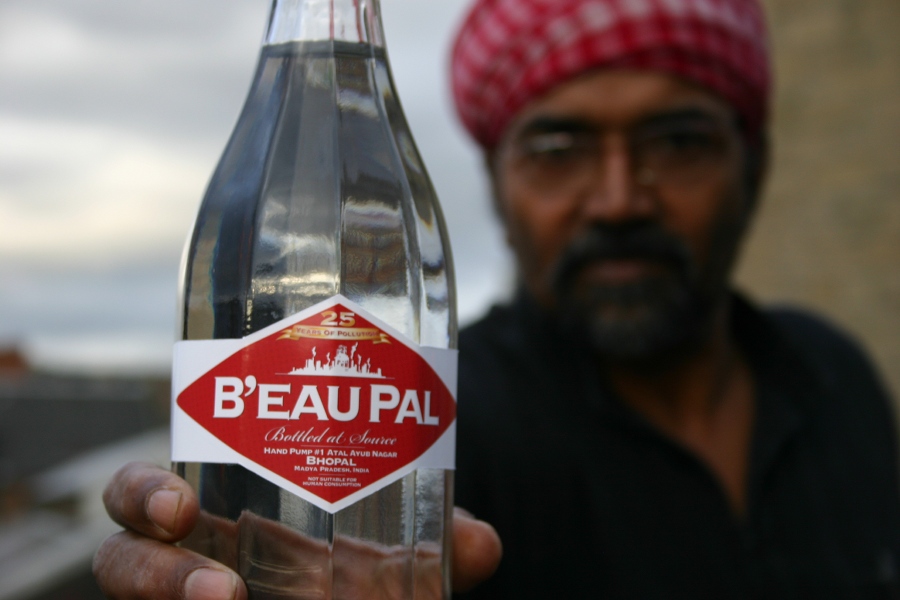Dow Chemical Runs Scared From B’Eau Pal Water
Posted by keith on July 14th, 2009
On the night of Dec. 2nd and 3rd, 1984, a Union Carbide plant in Bhopal, India, began leaking 27 tons of the deadly gas methyl isocyanate. None of the six safety systems designed to contain such a leak were operational, allowing the gas to spread throughout the city of Bhopal. Half a million people were exposed to the gas and 20,000 have died to date as a result of their exposure. More than 120,000 people still suffer from ailments caused by the accident and the subsequent pollution at the plant site.
These ailments include blindness, extreme difficulty in breathing, and gynecological disorders. The site has never been properly cleaned up and it continues to poison the residents of Bhopal. In 1999, local groundwater and wellwater testing near the site of the accident revealed mercury at levels between 20,000 and 6 million times those expected. Cancer and brain-damage- and birth-defect-causing chemicals were found in the water; trichloroethene, a chemical that has been shown to impair fetal development, was found at levels 50 times higher than EPA safety limits. Testing published in a 2002 report revealed poisons such as 1,3,5 trichlorobenzene, dichloromethane, chloroform, lead and mercury in the breast milk of nursing women. In 2001, Michigan-based chemical corporation Dow Chemical purchased Union Carbide, thereby acquiring its assets and liabilities. However Dow Chemical has steadfastly refused to clean up the site, provide safe drinking water, compensate the victims, or disclose the composition of the gas leak, information that doctors could use to properly treat the victims.
(from The Bhopal Medical Appeal website)
After 25 years of greenwashing and denial of their abhorrent abandonment of thousands of chemically-scarred people, Union Carbide and subsequently their owners Dow Chemical appear to have met their match. The temporary abandonment of the London site says more about Dow Chemical than any press statement or defensive advert ever could have: it says, “We refuse to face up to reality. We are in denial of the facts, and wish to remain in denial until the poisoned of Bhopal have died, and the world has moved on.” The people living with disease and deformity will eventually die, and the world will move on — probably because some other even more toxic event overshadows this one — which is why it is vital to keep reminding, and keep attacking those responsible.
The Yes Men take up the story of this brilliant stunt:
A new, beautifully-designed line of bottled water – this time not from the melting Alps, nor from faraway, clean-water-deprived Fiji, but rather from the contaminated ground near the site of the 1984 Bhopal catastrophe – scared Dow Chemical’s London management team into hiding today.
Twenty Bhopal activists, including Sathyu Sarangi of the Sambhavna Clinic in Bhopal, showed up at Dow headquarters near London to find that the entire building had been vacated.
Had they not fled, Dow employees could have read on the bottles’ elegant labels:
B’eau-Pal: Our Story
The unique qualities of our water come from 25 years of slow-leaching toxins at the site of the world’s largest industrial accident. To this day, Dow Chemical (who bought Union Carbide) has refused to clean up, and whole new generations have been poisoned. For more information, please visit http://www.bhopal.org.
The launch of “B’eau-Pal” water came as Bhopal prepares to mark the 25th anniversary of the Bhopal catastrophe, and coincides with the release of an official report by the Sambhavna Trust showing that local groundwater, vegetables, and breast milk are contaminated by toxic quantities of nickel, chromium, mercury, lead, and volatile organic compounds. The report describes how a majority of children in one nearby community are born with serious medical problems traceable to the contamination.
The attractive yet toxic product, developed by the Bhopal Medical Appeal and the Yes Men with pro-bono help from top London creative design firm Kennedy Monk , highlights Dow’s continued refusal to take responsibility for the disaster.
Though Dow has consistently refused to clean up the mess in Bhopal, they have taken numerous steps to clean up their image. In a recent press release, for example, Andrew Liveris, Dow’s Chairman and CEO, noted that “lack of clean water is the single largest cause of disease in the world and more than 4,500 children die each day because of it.” He went on to assert that “Dow is committed to creating safer, more sustainable water supplies for communities around the world.”
The Yes Men met Liveris’ attempt to greenwash Dow’s environmental record with a challenge.
“Since Liveris earns $16,182,544 per year, he could give each of the children who die worldwide for lack of clean water $10 per day to buy Evian, Fiji Water, or Perrier,” said Mike Bonanno of the Yes Men. “Or, for vastly less money, he could build them clean-water pipelines, like the ones that Bhopal so badly needs.”
Dow’s greenwashing comes while Bhopal is experiencing an extremely rare drought, just three years after facing its greatest floods ever. “Even though people are already dying by the hundreds of thousands, and we know that climate change will kill many more, companies like Dow are not being forced to cut back on emissions,” said the Sambhavna Clinic’s Sathyu Sarangi. “Bhopal should be a lesson to the world – one we must learn before it’s too late for all of us.”







August 14th, 2009 at 12:14 pm
Corporations, that are after all, aggregates of individual humans, are somehow able to benefit from suprahuman rights while at the same time ducking human responsibility. Another foible of unchecked market democracy? Or is market democracy an oxymoron?
[Yes, Pete, “market democracy” is definitely an oxymoron. I’m assuming you have watched The Corporation, if not then I recommend it. Get angry and subvert. K.]